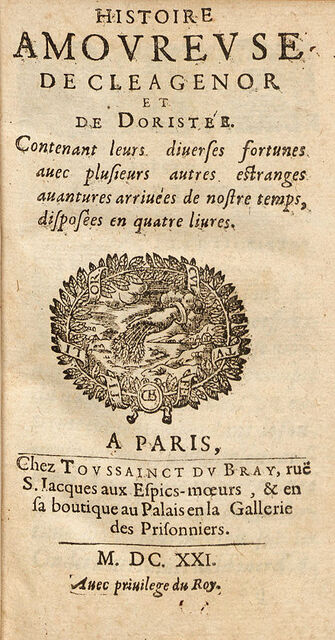|
For the most part, I read these plays with a critical, objective eye, but occasionally some of the writing and logic inherent in these classical plays is absolutely absurd. In Cleagenor et Doristee, the two lovers are being chased by a rival when they are separated and Doristee is abducted by thieves disguised as a man. She ends up in the house of Theandre as a servant, where everyone proceeds to fall in love with her. The wife and her servant fall in love with the disguise, and Theandre falls in love when he overhears Doristee lamenting her position. The married couple proceeds to be angry with the other for the same sin that both have committed, when Doristee hears that Cleagenor is dead. Like in any other play from this period, if a messanger comes to tell of the death, you can be sure that the character is not actually dead. Sure enough, when Cleagenor turns up at the house of Theandre, he tells him that Doristee was murdered by thieves, right before Doristee herself enters the room. Theandre then says "J'ai voulu par la peine augmenter votre joie" which I find to be the most absurd part of this play. The suspension of disbelief can only take so much, and I simply cannot understand these characters who behave in a way that is completely illogical to me and does not serve the plot in any true way.
0 Comments
Finally we have arrived at Pierre Corneille and his first play, Melite ou Les Fausses lettres, which is a bit of a misnomer because by my count there is only one false letter. Two men are in love with Melite, but she only loves one. In revenge, the spurned lover sends a false letter from Melite to another man, who falls in love with Melite due to the passion of his letter, ruining both his and Melite's relationships, until it is revealed that the letter was fake and everyone is fine. One thing that I did enjoy about this play however is the strength and depth of the two female character's. Melite does not feel the need to behave in the style of a traditional heroine and she has no problem saying no to her suiters. When her lover asks her for a kiss as proof of her love, she says no, he should trust that her words are enough. Likewise, Cloris, whose lover is the subject of the false letter, when discovering that her lover has abandoned her, rather than despair, she becomes angry. When that lover comes crawling back, she does not embrace him with open arms, but instead spurns him for his disloyalty and mocks him. While there are many issues of gender in this play, as in most plays of the 17th century, I am impressed by the depth of Corneille's female characters.
Fool me once with a character death, shame on you Pierre du Ryer. Fool me twice with a character death, shame on me. You cannot, I repeat, cannot, kill the same character three times in the same play and then have them come back three times. This play would put modern soap opera writers to shame for the frequency with which it tries to fool or shock its audience. I always thought that the rule of vraisemblance, or verisimilitude in neoclassical plays was a little silly. The subjects of most plays are outside of the realm of normal life, that’s what makes them dramatic. But now I understand that the rule was intended to prevent plays like this one from ever being conceived. I don’t want to say that the play was bad or not well written, it's simply the fact that there is enough material here for three separate plays. Many critics of the neoclassical plays says that the plot is too tight, that there is not enough going on to capture the audience’s attention, in contrast to Shakespearean drama that has subplots in its subplots, but it is this concise plot that makes those plays so gripping. Plays like Clitophon, where one can barely tell where the characters are, much less what is happening, is not immersive in the way Phèdre is because it is too concerned with being unpredictable and not enough about whether or not the audience actually cares what happens to its heroine the second or third time that she miraculously comes back to life.
|
Jennifer KellettM.A. French Literature Florida State University Archives
June 2021
Categories |
Photos used under Creative Commons from mharrsch, Renaud Camus



 RSS Feed
RSS Feed
